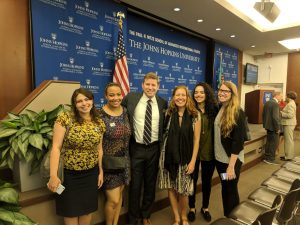Why All Millennials Should Care About Foreign Policy
Before the so-called “Islamic State” (IS) proclaimed Raqqa its “capital,” my family used to summer there in my grandfather’s home. Between his political career and his medical practice, my grandfather was a renowned Syrian novelist. During those summer days, I remember peering into the private office where he often sat reading in a blue armchair encircled by crowded bookshelves. I trace my love of storytelling to Raqqa, to that sight of my grandfather reclining in his blue armchair with a pen in his hand.
The Raqqa of those summers is now unrecognizable. The U.S. led coalition’s “cataclysmic barrage of firepower” liberated the city from IS control last October, and a year later, the city lies in heaps of broken concrete. My memories of Raqqa, of writers reclining in armchairs, are now intimately intertwined with matters of U.S. foreign policy.
When people ask what piqued my interest in international peace and security issues, I often simply point to that background. I’m a Syrian-American Muslim who lived in Saudi Arabia for five years. Perspective included. No assembly required. Growing up and attending university in Ohio, however, I recognized that the issues that mattered daily to my family and friends from the Middle East hardly registered for my Midwestern classmates. In Columbus, conversations regarding international conflicts and U.S. foreign policy were often confined to lecture halls, relevant student organizations, or debated among Arab-American friends over card games and evening cups of coffee.
As a screenwriting minor at The Ohio State University, I drew on the love of storytelling I inherited from Raqqa to make issues of foreign policy more accessible to my peers, trying to humanize the Syrian war and model effective representation of Arab characters. But it wasn’t until I began my Herbert Scoville Jr. Peace Fellowship in Washington D.C. that I gained a clearer vision of why issues of international peace and security should matter to average Americans, particularly fellow millennials: U.S. foreign policy tells a story about our values, our history, and our priorities abroad. And every American is on the byline.
I’m spending my Scoville Fellowship at Win Without War, a public education and advocacy coalition calling for a more progressive conception of U.S. foreign policy. One of my current projects involves rethinking our national security spending, prompting questions of how we even define “national security” in the first place. Like our foreign policies, budget proposals are more than tables of numbers and copious amendments. They tell a story about our values, our priorities, and what tools we think are most important to addressing the century’s coming challenges.
I also have the opportunity to bring an Arab-American voice into policy conversations at a time when the president stokes fear of a group of migrants travelling to the U.S. border from South America by claiming, without evidence, that “Middle Easterners” travel among them. “And guess what?” he said. “We’re not allowing them in our country.”
But “Middle Easterners” are already in the country. They came as slaves in the hulls of Portuguese ships on expeditions to the Americas when the mere idea of the United States was decades from conception. Arabs and Muslims are essential characters in this country’s story, but the Trump administration’s attempt to set those communities apart from average Americans is indicative of a larger pattern of dehumanization that enables the militarization of our foreign policy in the Middle East. The same ignorance that leads to Islamophobia at home makes it easier to drop drones with little concern for civilian casualties or flatten entire cities, like Raqqa. Domestic and foreign policy are inseparable in that respect. The policies that impact Muslims and Arabs are not “foreign” policies. They’re American policies.
This is why I’ve found Win Without War’s mission to democratize foreign policy, and to break down the barriers between domestic policy and foreign policy, so vital and so inspiring. When Win Without War advocates for a more progressive vision of U.S. foreign policy, we advocate for a more progressive story of the U.S. abroad, one that eschews American exceptionalism and centers the voices of those most affected by our policies overseas.

Laila with members of the Win Without War team after attending Sen. Bernie Sanders’ speech on foreign policy at SAIS.
Helping Win Without War rewrite these particular stories matters to me, but there are plenty of other stories to be told, all with different priorities and perspectives tackling subjects from nuclear nonproliferation to peacebuilding. Almost two months into my fellowship, I have heard a diverse array of them. But there has to be more, especially from fellow millennials.
As long as foreign policy continues to be dominated by old white men with similar views of the world, the U.S. will continue to tell the same story overseas. And with polls of millenials indicating that millennials are less likely to support military-first foreign policies, that story does not reflect our beliefs. If we want the U.S. story overseas to reflect our values and priorities, it’s time for the next generation of millennial policy thinkers and analysts to enter the international peace and security field and pick up the pen.
Laila Ujayli is a Fall 2018 Scoville Fellow at Win Without War.


